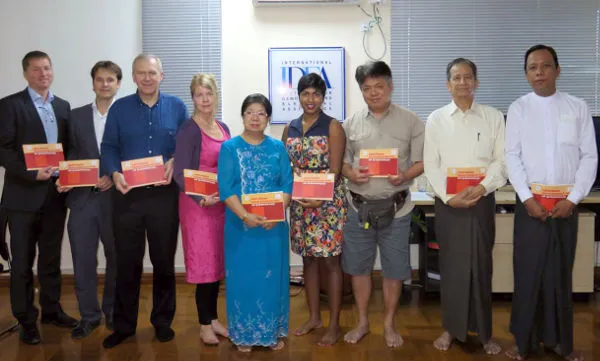Challenge of defining ’gender’ in Myanmar language: ‘English-Myanmar Glossary of Democratic Terms’ published

On 18 January 2015, International IDEA Secretary-General Leterme presented the first edition of the ‘English-Myanmar Glossary of Democratic Terms’ to experts who contributed to it at International IDEA’s Myanmar office. The purpose of this publication – produced together with the Local Resource Centre (LRC), a Myanmar-based civil society organization - is to promote the development of a shared vocabulary and common definitions in Myanmar to discuss democratic developments, including gender issues.
Produced with Myanmar experts
The Glossary is the result of 12 months of work by 13 contributors representing academics, lawyers, gender experts, political scientists, linguists and a member of the Union Election Commission. The group met in sessions facilitated by International IDEA staff to discuss, debate and form consensus on these terms. Many of these terms such as federalism, gender and direct democracy had never existed in the Myanmar language before.
The contributors experienced difficulty in defining the concept of gender and translating it into an understandable definition in the Myanmar language. With facilitation by International IDEA and much discussion amongst gender experts, the team slowly built definitions not only for the term ‘gender’ but also for concepts like gender equity and equality. This experience highlights the need for a product such as the Glossary and a commonly accepted definition of complex terms.
Welcoming input for further improvement
The aim of the Glossary is not to provide static definitions, but to serve as a starting point for public discourse and become a dynamic document. Therefore, it is supported by a website - www.democraticglossary.org.mm - and an Android app where users can search for terms, browse through different categories like Gender, or leave comments about the terms and suggestions for additions. There has been a great interest in the Glossary. Since the launch it has been downloaded over 1500 times and the Yangon office has already distributed 500 hardcopies, with a reprint of 2000 copies on the way.



